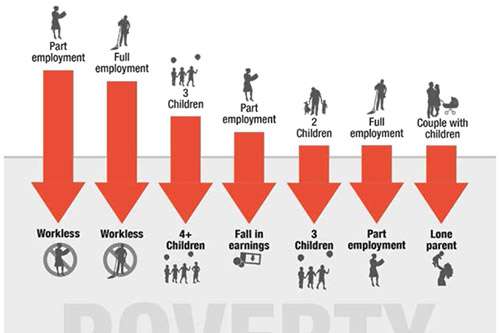New research reveals why children move into poverty

New research published today by NatCen Social Research and City University London uncovers the family-related factors driving changes in income that shifts a family below the poverty line.
, Child Poverty Transitions, shows that the main factor causing
children to fall into poverty is worklessness – around two in five children whose family became workless fell into poverty (42 per cent with parents initially in part-time work and 38 per cent with parents initially in full-time work).It also reveals other factors driving transitions into poverty, including having more children and parental separation.
- New families: A quarter (26 per cent) of 'new families' were in poverty in the year after having their first child. Having a third or fourth child increased the chances of entering poverty compared to one or two child families
- Lone parents: Around eight in ten (79 per cent) lone parent families were in poverty in the year after having their first child. While all children whose parents separated were at increased risk of entering poverty (12 per cent)
- Occupation: Families where the main worker worked in the sales and customer service industry were slightly more likely to enter poverty than other occupations
- Ethnicity: Pakistani, Bangladeshi, and Black African children were more likely to fall into poverty than children of other ethnicities.
A quarter of children experience poverty
The report also shows how children move in and out of poverty over time, finding that around a quarter of children in the UK were below the poverty line at some point between 2010 and 2012.
During the two year period 12 per cent of children remained in poverty throughout, 7 per cent fell into poverty and 6 per cent escaped from poverty.
Dr Matt Barnes, from the Department of Sociology at City, said: "Understanding the transitions or movements into and out of poverty is essential if we want to put in place mechanisms to prevent people falling into poverty and to help them escape from it.
"Government may want to look at what it can do to provide greater protection for lone-parent families, larger families and people starting a family for the first time, and for families that experience events such as loss or reduction of work or earnings, and parental separation."
Provided by City University London
















